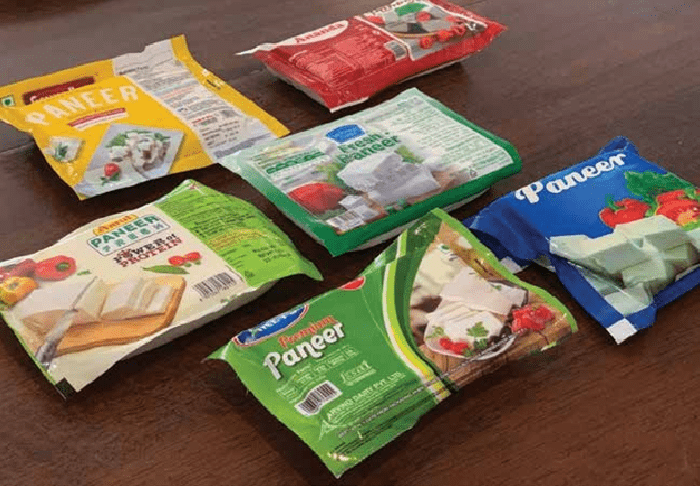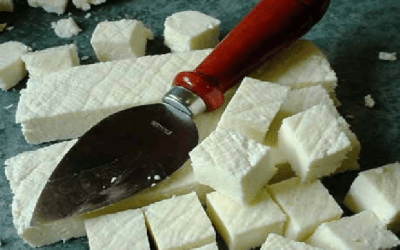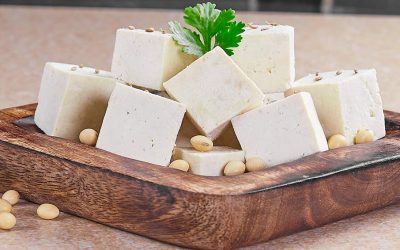Packaged Paneer

The delicious and easy-to-please everyone paneer does not need any introduction. The popularity and usages of it is archaic and revered by all. However, while choosing a packet of fresh packaged paneer, what parameters we look at in choosing the best product. Here’s our guide that tells you how to pick your paneer brand wisely.
A Consumer Voice Report
We know paneer as an indigenous milk product prepared by the combined action of acid coagulation and heat treatment of milk and subsequent drainage of whey. To prepare paneer, food acid (usually lemon juice, vinegar, citric acid or yogurt) is added to hot milk to separate the curds from the whey. The curds are pressed in muslin or cheese cloth and the excess water is drained out. The resulting paneer is dipped in chilled water for 2–3 hours to give it a good texture and appearance. The preparation of paneer diverges based on its use and regional variation.
How we test
The test programme for comparative testing of paneer has been done following the Food Safety & Standard Regulations and relevant Indian standard IS: 10484 (specifications for paneer) which covers the product requirements and methods of tests.
Brands Tested
We purchased 11 regular selling brands of fresh packaged paneer for comparative testing. The table below represents which brands scored what, so that you can buy only the best.
Comparative Product Testing
| Rank | Score Out of 100 | Brand | Quantity, gms | MRP,
Rs. |
Best Before, days | Manufacturer/ Marketer |
| 1 | 91 | Ananda | 200 | 75 | 15 | Gopaljee Dairy Foods Pvt. Ltd |
| 1 | 91 | Amul | 200 | 74 | 45 | Gujarat Co-operative Milk Marketing Federation Ltd |
| 1 | 91 | DMS | 200 | 60 | Use by date# | Delhi Milk Scheme |
| 2 | 90 | Paras | 200 | 75 | 15 | VRS Foods Pvt. Ltd., Delhi |
| 3 | 89 | Mother Dairy | 200 | 75 | 15 | Mother Dairy Fruit & Vegetable Pvt. Ltd |
| 3 | 89 | Nova | 200 | 70_ | 10 | Sterling Agro Industries Ltd, |
| 3 | 89 | Madhusudan | 200 | 75 | Use by date# | SMC Group |
| 4 | 88 | Vita | 200 | 65 | Use by date# | The Ballabhgarh Co Op Milk Producers Union Ltd |
| 5 | 86 | Gowardhan | 200 | 85 | 75 | Parag Milk Foods Ltd, Mumbai |
| 6 | 85 | Patanjali | 200 | 75 | 45 | Patanjali Ayurved Ltd |
| 7 | 84 | Heritage | 200 | 75 | 15 | Heritage Food Ltd |
Ratings: >90 – Very good *****, 71-90- Good****, 51-70- Average ***, 31-50- Poor **, <30 – Very Poor*
# Use by date is given where shelf life of product is less than 7 days
CV Recommendations
Top Performer
Ananda, Amul & DMS
Value for Money Brand
DMS
Key findings
• Based on the overall scores, three brands Ananda, AMUL and DMS have secured the No. 1 position.
• Additionally, DMS has been nominated as The Value for Money Brand. The product priced at Rs.60 for 200-gm followed by Vita at Rs. 65 for 200-gm.
• DMS has been found with the highest fat followed by Ananda and Amul.
• Highest protein has been found in Nova followed by Amul.
• We have found Patanjali with lowest cholesterol (made from cow milk).
• All the tested brands have met the national
standards requirements.
• All the brands have passed microbiological safety parameters; thus, they are safe to consume.
• One should preferably buy packaged paneer and store in refrigerator. Consumers must avoid consuming paneer in raw form; one can make it at home if the packaged product is not available in the nearby market. Home-made paneer is the best.
• At retailer level, the FSSAI prescribes microbiological requirements of Salmonella and Listeria Monocytogenes only. Other microbiological parameters such as TPC, E.coli, Coliform, Yeast and Mould and S.aureus are not applicable at retailer level. These requirements should be relevant at retailer level which is the collection point for consumers.
Test results
Milk Fat| Protein| Organoleptic Tests| Microbiological Safety| Energy Value| Cholesterol| Moisture| Titratable Acidity as lactic acid
COMPARATIVE PERFORMANCE (SCORE) OF PACKAGED PANEER
| Brand→
Parameter ↓ |
Wt.
% |
Ananda | Amul | DMS | Paras | Mother dairy | Nova | Madhu- sudan | Vita | Goward- han | Patanjali | Heritage |
| Moisture | 8 | 6.94 | 6.75 | 7.23 | 6.80 | 6.91 | 6.48 | 6.85 | 6.16 | 6.69 | 6.06 | 6.06 |
| Milk fat | 20 | 18.74 | 18.68 | 19.58 | 18.32 | 18.38 | 16.76 | 17.48 | 17.42 | 17.44 | 17.18 | 17.78 |
| Titratable acidity as lactic acid | 5 | 4.55 | 4.70 | 4.40 | 4.70 | 4.85 | 4.25 | 5.00 | 4.40 | 4.25 | 3.80 | 3.95 |
| Protein | 18 | 16.27 | 17.41 | 13.01 | 15.92 | 16.29 | 17.55 | 16.26 | 15.78 | 15.81 | 12.90 | 12.82 |
| Energy value | 8 | 6.77 | 6.61 | 7.37 | 6.59 | 6.81 | 5.68 | 6.73 | 5.70 | 5.52 | 5.64 | 5.66 |
| Cholesterol | 8 | 6.74 | 5.74 | 7.97 | 6.83 | 5.23 | 7.65 | 5.80 | 7.45 | 4.83 | 8.00 | 7.10 |
| Microbio- logical safety ( Salmonella & Listeria Monocyto- genes) | 10 | 10 | 10 | 10 | 10 | 10 | 10 | 10 | 10 | 10 | 10 | 10 |
| Organoleptic tests
(Colour & Appearance, Body & Texture, Package) |
16 | 14 | 14 | 14 | 14 | 14 | 14 | 14 | 14 | 14 | 14 | 14 |
Test Parameters
The test parameters have been adopted following the FSSAI regulations and relevant Indian Standard IS:10484. We conducted the comparative testing in a NABL lab for physical, chemical, microbiological and organoleptic parameters and the details are given below:
Milk Fat (dry matter basis)
Paneer contains mainly milk fat, which contributes greatly to good health. Fat helps in gaining weight as well as it helps in digesting certain fat-soluble vitamins. The percentage of fat in paneer varies due to the availability of fresh milk and variation in milk composition. Hence as per the national standard, paneer should contain at least 50 per cent fat when measured on dry basis. All the brands have fat content above the minimum requirement of 50 per cent on dry matter basis. Hence, they have met the standard requirement. DMS had highest fat followed by Ananda and Amul.
Protein
Paneer is rich and inherent source of protein and calcium. National standard has not prescribed any requirement of protein however protein is good for health. It helps keep your muscles strong and healthy. You need protein in your diet to help your body repair cells and make new ones. Protein is also important for growth and development in children and teens. We found highest amount of protein in Nova followed by Amul and Mother Dairy and the level found lowest in Heritage and Patanjali.
Organopetic tests
Following sensory attributes have been judged by lab experts and their observations are given below:
a) Colour and appearance- Paneer shall be clear and free from dirt, surface discoloration, insects and rodent contamination, free from foreign matter/particles and adulterants. It shall not have any free moisture/water. It should have milky white colour and no extraneous coloring matter shall be added to paneer.
b) Body and texture – Paneer shall have a closely knit smooth and homogeneous texture, firm, cohesive and spongy body.
c) Package: Packaging shall be in good condition without damage.
The above attributes have been examined in the lab. All the brands have creamy colour and soft mass in appearance. Body and texture are soft mass having crumbly and compact texture.
Microbiological Tests
The FSSAI has specified microbiological requirements for process hygiene criteria and food safety criteria. Microbiological parameters under process hygiene criteria are TPC, E.coli, Coliform, Yeast and Mould and S.aureus but these requirements are not applicable at retailer/consumer level.
We tested Salmonella and Listeria Monocytogenes under food safety criteria of FSSAI.
Salmonella and Listeria Monocytogenes are pathogenic bacteria and cause seriously upsetting the stomach. These shall be absent at retailer level. Salmonella and Listeria Monocytogenes have been absent in all the brands, thus all brands passed microbiological food safety criteria.
Energy value
Food we eat provides energy in the form of calories. We need a minimum number of calories from food to sustain basic metabolic functions and more to carry out physical activities. There is no specified standard requirement. However, the energy value has been measured to verify the label claims and compare them. We found DMS with highest energy value followed by Mother Dairy and Ananda.
Cholesterol
Cholesterol is necessary to the normal permeability and function of the membranes that surround cells. Your body needs some cholesterol, but too much can raise your risk of heart disease. A diet high in saturated fats tends to increase blood cholesterol levels, whereas a diet high in unsaturated fats tends to lower blood cholesterol levels. There is no specified standard requirement. However, it should be on lower side. Brand Patanjali has lowest cholesterol (made from cow milk). We found highest amount of cholesterol in Gowardhan followed by Mother Dairy and Amul.
Moisture
Paneer is a highly perishable milk product which deteriorates rapidly because of high moisture content. Moisture up to a certain limit is an inherent part of fresh paneer. As per the national standards, it should not be more than 60 per cent by mass. All the brands have been found well below the specified limit of 60 per cent moisture. DMS had lowest moisture contents followed by Ananda among the brands tested.
Titratable Acidity as lactic acid
Titratable Acidity as lactic acid is a measure of the amount of acid present. It shall be 0.50 maximum in paneer as per the BIS standard. Our test has found it within the specified standard limit.
Packaging
Paneer shall be packed in clean suitable food grade packages/wrappers which protect them from imparting off-flavor or odour. It also protects food from product contamination. Only food grade packaging conforming to the relevant Indian Standard should be used. Packaging should not be torn/damaged. All the brands have been packed in printed high-density poly pack (plastic) material and found in good condition.
Labeling/Marking Requirements
As per the national standards, following details should be clearly and indelibly marked on the product label:
– Name and trade name of the product
– Name and address of the manufacturer/ marketer
– Batch or code number
– Net weight in grams
– Date of manufacture
– Best before/use by date
– Green dot mark
– Instructions for storage
– Nutritional information
– M.R.P
– Customer care details
All the brands fulfilled the marking/labeling national standards requirements.
Physicochemical Test
Net Weight
The net weight of paneer has been measured and compared with their declared values. And, we found all the brands with net weight above the declared quantity.
Why to have paneer?
1. Paneer contains good amounts of fat, protein and calcium.
2. Paneer is a good source of calcium, which helps build strong bones and teeth, and also prevents osteoporosis.
3. Paneer is a good source of protein and bone health. In 100-gram of paneer, you will get 14- 20-gram of protein.
4. Owing to its high nutrition and high fat, paneer is good for children. It can be consumed once or twice a week.
5. It would be better to avoid regular consumption of paneer for those with hypertension and diabetes due to its high level of fat and cholesterol. It can however, be used in small quantities for such patients once or twice a week.
Handy tips to make paneer at home
• Bring the milk to a temperature just below boiling. Then turn off the heat.
• Add lemon juice or citric acid, 5-ml (one teaspoon) at a time. Stir the milk until the milk separates;
the solid curds part from the green and watery whey.
• If milk does not start to curdle immediately, start by adding only one teaspoon of lemon juice at a time in a stepwise manner until the milk curdles. Do not add more lemon juice than necessary; otherwise, the paneer will not be soft, as well as will taste sour and bitter.
• Stirring gently and continuously
• Curdling process is finished once the curds have stopped precipitating from the greenish
colored liquid whey.
Related
Paneer- which brands did (not) clear the microbiological safety test?
Paneer, the delight and pride of vegetarians, is consumed widely in India and the packaged product and the loose variant have their own share of...
All About Paneer: how to make paneer, nutrition facts and how to buy and store paneer
Paneer is a byproduct obtained from milk by precipitation with sour milk, lactic acid, or citric acid. In simple terms, paneer is an indigenous milk...


